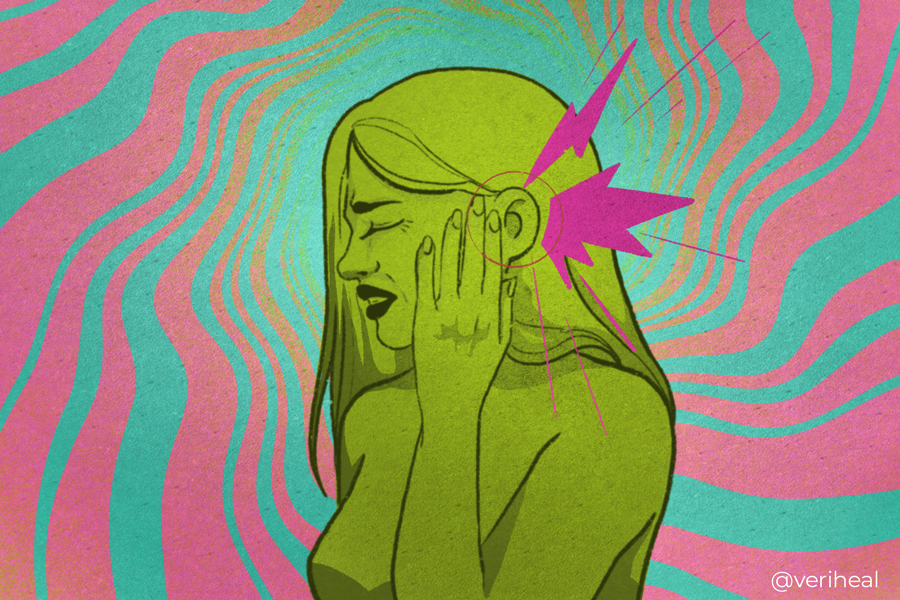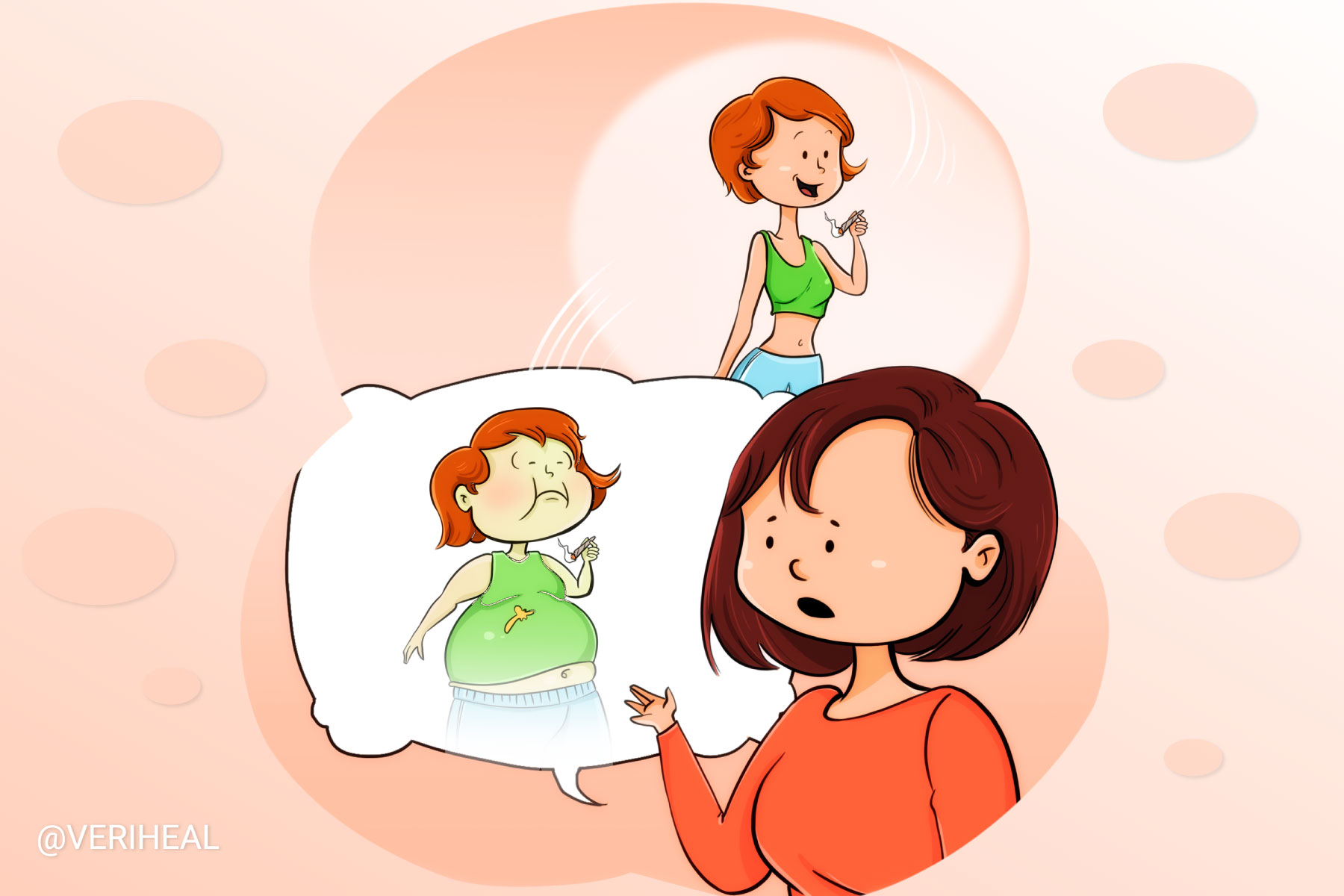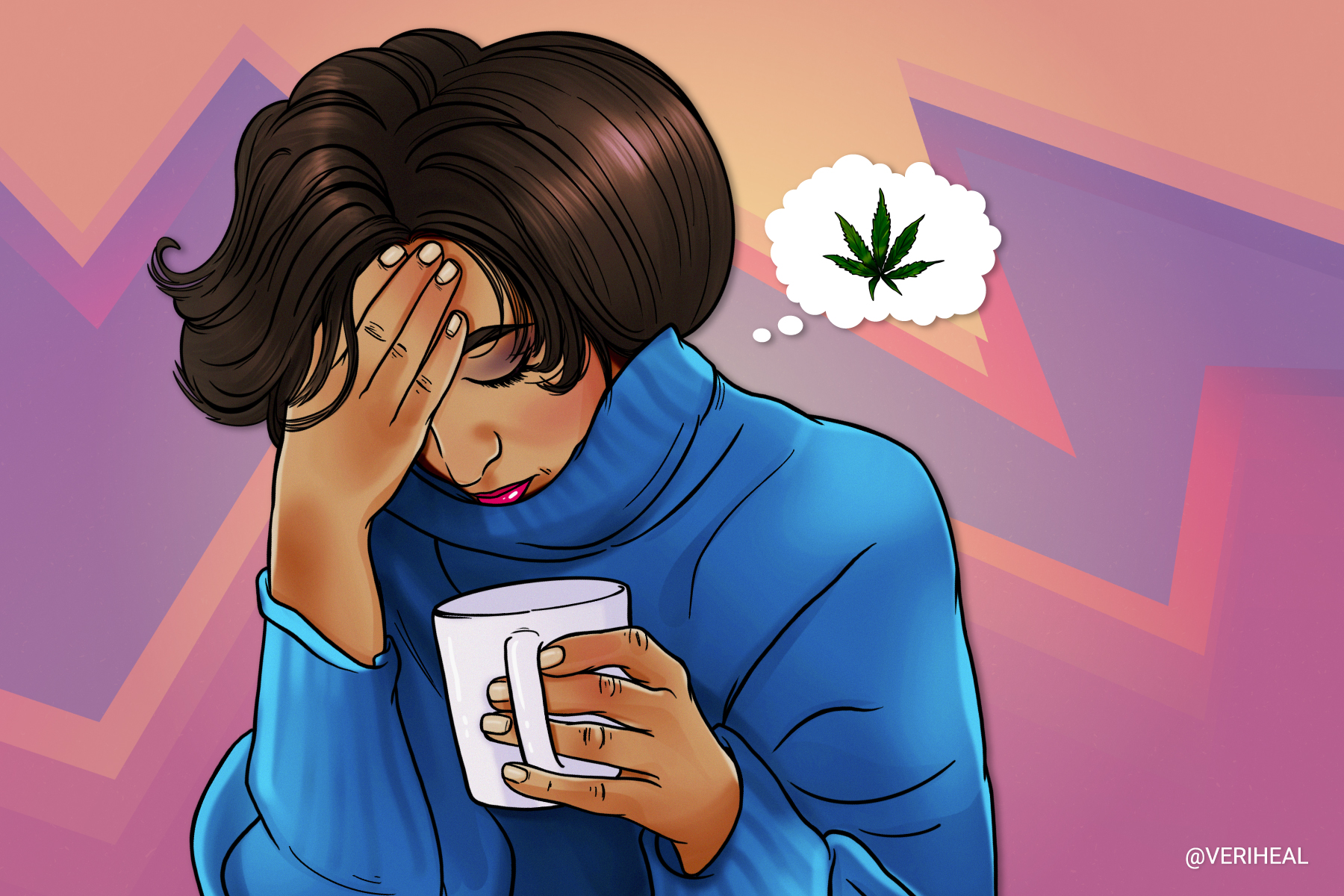Is Marijuana an Option for Improving Meniere’s Disease?

- Meniere’s Disease & Medical Cannabis
- Thoughts to Consider
- Subtypes and Symptoms of Meniere’s Disease
- MD Stages
Meniere’s disease (MD) is a vestibular disorder, or rather it originates from the inner ear. This condition is also called Idiopathic Endolymphatic Hydrops, referring to a buildup of fluid in the inner ear due to an unknown cause. Many MD patients experience extreme episodes of vertigo which is when the room spins or objects move around you, along with tinnitus (ringing of the ears). Unfortunately, many MD patients experience hearing loss that is caused by these episodes or attacks. It usually affects one ear at a time but can cause problems in both. Accompanying symptoms may include migraines and ear pressure or fullness. Diagnosis is made with the presence and timed recurrence of such symptoms, and may require audiometric or other hearing and balance testing (14).
Along with these attacks, many patients experience uncontrollable nausea and vomiting. Fortunately, medical cannabis and its cannabinoids, including Δ9-tetrahydrocannabinol (THC) and cannabidiol (CBD) have been shown to be very effective in relieving nausea.
Cannabis begins its work entering the body through the endocannabinoid system (ECS). This system consists of fat-based neurotransmitters that are responsible for a variety of processes in the body including modulation of the immune system as well as our perception of pain. Cannabinoids interact with the body through the ECS by contacting cannabinoid receptors CB1 and CB2.
Recent research has shown that both CB1 and CB2 receptors can be found in the cochlear nucleus, the portion of the brainstem that helps regulate balance, along with 2-arachidonoylglycerol (2-AG) (15). This is important because doctors theorize that tinnitus, one of the main symptoms of Meniere’s disease, is a form of sensory epilepsy that is caused by neuronal, or nerve cells firing too quickly in the cochlear nucleus.
Research also has shown that there are significant numbers of CB1 receptors in the vestibular nucleus complex (VNC). The VNC is located in the medulla and works together with the cerebellum to experience the proper perception of what is around us and how fast our head is moving (14). Scientists believe that we might be able to target vertigo through the ECS because of this.
For more information on how the endocannabinoid system works, please see our page on endocannabinoids here.
Meniere’s Disease & Medical Cannabis
Though there is not much research about treating MD with cannabis, there is some research that has been done on many of the symptoms that are associated with it. Many patients have found relief for the following MD symptoms while using medical marijuana:
- Nausea & Vomiting – There is a lot of evidence that suggests that medical marijuana does a good job controlling nausea, especially in patients with cancer and human immunodeficiency virus or acquired immunodeficiency syndrome (HIV/AIDS). THC activates CB1 receptors in the dorsal vagal complex, the nerves that are responsible for controlling vomiting (11). CBD may also contribute to anti-nausea effects potentially by modifying select serotonin receptors, rather than activating them.
- Anxiety – Cannabis can help relieve the anxiety associated with a chronic condition such as Meniere’s disease. Once the CB1 receptors are activated, they directly affect the serotonin 5-HT1A receptor and transient receptor potential vanilloid type 1 (TRPV1) (11). These receptors play a role in regulating fear and anxiety-related behaviors (3).
- Vertigo – Researchers believe that the symptom of vertigo is linked to the endocannabinoid system since many cannabis users experience vertigo as a side effect. Though there is not a lot of research on marijuana and vertigo, many patients say that cannabis helps this symptom.
Thoughts to Consider
It is important to talk to your physician about taking medical cannabis to relieve your MD symptoms, especially because many patients end up taking epilepsy drugs to help control their symptoms. It is possible that these drugs could have interactions with cannabis, notably by potentially elevating liver enzymes.
Meniere’s disease could be a result of another more serious or insidious process, and you may need imaging or other specialized testing as determined by your provider to rule out other diagnoses. Symptoms like sudden hearing loss, severe pain, and other neurologic problems should be evaluated promptly by a healthcare provider to prevent permanent hearing damage and other potentially serious sequelae.
Another thing to keep in mind is there is little research supporting marijuana use in tinnitus (ringing of the ears), vertigo, and MD (14). There is limited data looking at medical marijuana and its potential to cause tinnitus and vertigo as side effects (19). However, there are patient testimonials and case studies discussing the benefits of using cannabis for MD.
Subtypes and Symptoms of Meniere’s Disease
Meniere’s Disease is characterized typically by vertigo, hearing loss, migraines, ear pressure, and ringing of the ears that progresses as the patient ages, though there is no specific age at which symptoms usually begin. MD is common in patients with autoimmune diseases as well as those who have migraines (6). It can be loosely classified into the subtypes below:
Classic Meniere’s Disease (MD)
Patients with classic MD experience random vertigo attacks that often come with nausea, vomiting, gradual loss of hearing, ringing in the ears, and a feeling of fullness or pressure in the affected ear (7). Hearing loss in the affected ear begins with sounds that are low frequency that eventually progresses into losing the ability to hear higher frequency sounds. Unfortunately, hearing symptoms typically worsen over time as the patient experiences more attacks.
Researchers believe that unilateral, or classic MD is the most prevalent form with an estimate that 80% of MD patients experience this form of it (7).
Bilateral Meniere’s Disease (BMD)
BMD is very similar to classic MD but is characterized by fluctuating hearing loss in both ears along with episodes of vertigo. Typically, a patient has MD in one ear and then it later develops it in the other ears. Half of the time it happens in two years. Additionally 75% of patients who go on to develop BMD do it within five years of the initial onset of MD (7). When a BMD patient experiences symptomatic improvement after taking oral steroids, they may get a differential diagnosis of autoimmune inner ear disease instead.
Familial Meniere’s Disease (FMD)
In some Meniere’s patients, doctors believe there is a genetic cause. They believe this is linked to the fact that MD is more common in patients of European descent as opposed to African or Asian descent (6). Researchers have identified DTNA and FAM136A genes that are linked to patients with FMD.
Vestibular Meniere’s Disease (VMD)
In VMD, vertigo attacks come along in episodes much like it does in classic MD. Patients with VMD do not have hearing loss, ringing of the ears, or pressure, or fullness in their ears (7).
MD Stages
Patients with Meniere’s disease often experience symptoms that can change over time. With these changes in symptoms, the stage of MD also changes (16). Researchers have recently proposed changes to these stages to include testing measurements, but currently, the stages of MD are (16):
- Stage 1 – also known as the cochlear stage, occurs when the patient experiences hearing loss and tinnitus.
- Stage 2 – involves the vestibular system. Patients experience stage 1 symptoms as well as dizziness.
- Stage 3 – hydrops that have formed in the ear labyrinth are more extensive and block endolymph flow. These patients have permanent hearing loss, severe ringing in the ears, and dizziness.
- Stage 4 – hydrops in the inner ear fills the labyrinth completely and endolymph pressure cannot rise, which causes dizziness to subside, but unsteadiness remains. The hearing loss experienced by the patient is more severe.
- Stage 5 – multiple ruptures of the inner ear labyrinth have occurred, no vertigo is experienced in this stage, only unsteadiness. Hearing loss is either profound or total.
Note: Veriheal does not intend to give this as professional medical advice. Do not attempt to self-diagnose, or prescribe treatment based on the information provided on this page. Always consult a physician before making any decision on the treatment of a medical condition.
1. Baek, J.-H., Zheng, Y., Darlington, C. L., & Smith, P. F. (2008). Cannabinoid cb2receptor expression in the rat brainstem cochlear and vestibular nuclei. Acta Oto-Laryngologica, 128(9), 961–967. https://www.tandfonline.com/doi/abs/10.1080/00016480701796944
2. Bankhead, C. (2019, September 16). Possible link between marijuana use, tinnitus. Medical News. https://www.medpagetoday.com/meetingcoverage/aaohnsf/82180
3. Blessing, E. M., Steenkamp, M. M., Manzanares, J., & Marmar, C. R. (2015). Cannabidiol as a Potential Treatment for Anxiety Disorders. Neurotherapeutics : the journal of the American Society for Experimental NeuroTherapeutics, 12(4), 825–836. https://link.springer.com/article/10.1007/s13311-015-0387-1
4. Choukèr, A., Kaufmann, I., Kreth, S., Hauer, D., Feuerecker, M., Thieme, D., Vogeser, M., Thiel, M., & Schelling, G. (2010). Motion sickness, stress and the endocannabinoid system. PloS one, 5(5), e10752. https://www.ncbi.nlm.nih.gov/pmc/articles/PMC2873996/
5. Colucci, D. A. (2019). Cannabis and hearing care. The Hearing Journal, 72(8), 43. https://journals.lww.com/thehearingjournal/Fulltext/2019/08000/Cannabis_and_Hearing_Care__Hearing_Loss_and.12.aspx
6. Frejo, L., Soto-Varela, A., Santos-Perez, S., Aran, I., Batuecas-Caletrio, A., Perez-Guillen, V., Perez-Garrigues, H., Fraile, J., Martin-Sanz, E., Tapia, M. C., Trinidad, G., García-Arumi, A. M., González-Aguado, R., Espinosa-Sanchez, J. M., Marques, P., Perez, P., Benitez, J., & Lopez-Escamez, J. A. (2016). Clinical Subgroups in Bilateral Meniere Disease. Frontiers in neurology, 7, 182. https://www.ncbi.nlm.nih.gov/pmc/articles/PMC5075646/
7. Lance E. Jackson, H. S. (2002, August 19). Meniere’s disease: Diagnosis, natural history, and current Management LANCE E. Jackson Herbert silverstein. AudiologyOnline. https://www.audiologyonline.com/articles/meniere-s-disease-diagnosis-natural-1161
8. Living (well) with MENIERES Disease. Successful self treatment with cannabis. Medical Cannabis Awareness New Zealand. (2019, May 1). https://mcanz.org.nz/living-well-with-menieres-disease-successfull-self-treatment-with-cannabis/
9. Lopez-Escamez, J. A., Carey, J., Chung, W. H., Goebel, J. A., Magnusson, M., Mandalà, M., Newman-Toker, D. E., Strupp, M., Suzuki, M., Trabalzini, F., Bisdorff, A., Classification Committee of the Barany Society, Japan Society for Equilibrium Research, European Academy of Otology and Neurotology (EAONO), Equilibrium Committee of the American Academy of Otolaryngology-Head and Neck Surgery (AAO-HNS), & Korean Balance Society (2015). Diagnostic criteria for Menière’s disease. Journal of vestibular research : equilibrium & orientation, 25(1), 1–7. https://pubmed.ncbi.nlm.nih.gov/25882471/
10. Narwani, V., Bourdillon, A., Nalamada, K., Manes, R. P., & Hildrew, D. M. (2020). Does cannabis alleviate tinnitus? A review of the current literature. Laryngoscope Investigative Otolaryngology, 5(6), 1147–1155. https://onlinelibrary.wiley.com/doi/full/10.1002/lio2.479
11. Parker, L. A., Rock, E. M., & Limebeer, C. L. (2011). Regulation of nausea and vomiting by cannabinoids. British journal of pharmacology, 163(7), 1411–1422. https://www.ncbi.nlm.nih.gov/pmc/articles/PMC3165951/
12. Perin, P., Mabou Tagne, A., Enrico, P., Marino, F., Cosentino, M., Pizzala, R., & Boselli, C. (2020). Cannabinoids, inner Ear, hearing, And Tinnitus: A Neuroimmunological Perspective. Frontiers in Neurology, 11. https://www.frontiersin.org/articles/10.3389/fneur.2020.505995/full
13. Qian, Z. J., & Alyono, J. C. (2020). An association between marijuana use and tinnitus. American journal of otolaryngology, 41(1), 102314. https://www.ncbi.nlm.nih.gov/pmc/articles/PMC7278074/
14. Smith, P. F., Ashton, J. C., & Darlington, C. L. (2006). The endocannabinoid system: A new player in the NEUROCHEMICAL control OF vestibular Function? Audiology and Neurotology, 11(4), 207–212. https://www.karger.com/Article/FullText/92588
15. Smith P.F. (2011) The Endocannabinoid System in the Cochlear Nucleus and Its Implications for Tinnitus Treatment. In: Møller A.R., Langguth B., De Ridder D., Kleinjung T. (eds) Textbook of Tinnitus. Springer, New York, NY. https://link.springer.com/chapter/10.1007/978-1-60761-145-5_79
16. Sobhy, O. A., Elmoazen, D. M., & Abd-Elbaky, F. A. (2019). Towards a new staging of Ménière’s disease: a vestibular approach. Acta otorhinolaryngologica Italica : organo ufficiale della Societa italiana di otorinolaringologia e chirurgia cervico-facciale, 39(6), 419–428. https://www.ncbi.nlm.nih.gov/pmc/articles/PMC6966777/
17. U.S. Department of Health and Human Services. (n.d.). What is MÉNIÈRE’S Disease? – diagnosis and treatment. National Institute of Deafness and Other Communication Disorders. https://www.nidcd.nih.gov/health/menieres-disease
18. U.S. National Library of Medicine. (2021, June 2). Meniere’s disease | Meniere’s disease symptoms. MedlinePlus. https://medlineplus.gov/menieresdisease.html
19. Marijuana and tinnitus. The American Academy of Audiology. (2021, July 27). Retrieved October 11, 2021, from https://www.audiology.org/marijuana-and-tinnitus/

















